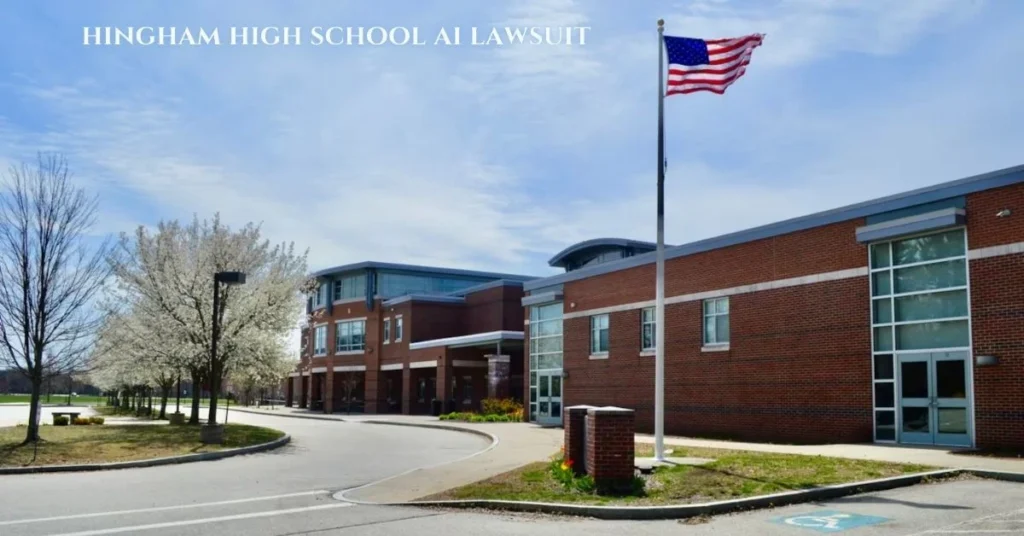Introduction to the Hingham High School AI Lawsuit
The Hingham High School AI lawsuit has sparked a heated debate about the role of artificial intelligence in education. As technology continues to evolve, so do its applications within our classrooms. Educators and administrators are grappling with how to utilize these advanced tools effectively while ensuring students’ rights and privacy remain protected. This case is more than just legal proceedings; it’s a pivotal moment that could shape the future landscape of educational practices across the globe. Let’s dive into what this lawsuit means for the world of learning and explore both sides of the AI conversation unfolding at Hingham High School.
ALSO READ: Steve Lawson and Trinity Bible Church: A Clarification
The Role of Artificial Intelligence in Education
Artificial intelligence is transforming education in remarkable ways. It can personalize learning experiences, adapting to the unique needs of each student. This technology analyzes performance data and tailors lessons accordingly.
AI tools also streamline administrative tasks for educators. Grading assignments or managing schedules becomes more efficient, allowing teachers to focus on what they do best: teaching.
Moreover, AI fosters engagement through interactive platforms and intelligent tutoring systems. These resources provide students with instant feedback, helping them stay motivated.
However, integrating AI into classrooms isn’t without challenges. Educators must ensure that these tools enhance rather than replace human interaction in learning environments.
As schools explore innovative solutions like AI-driven applications, understanding its role becomes crucial for shaping effective educational practices.
Benefits and Limitations of AI in Education
Artificial intelligence brings a host of advantages to the educational landscape. It personalizes learning experiences, tailoring content to individual student needs. Adaptive learning platforms can identify areas where students struggle and adjust resources accordingly.
Moreover, AI enhances administrative efficiency. Automation streamlines tasks like grading and scheduling, freeing educators to focus on teaching rather than paperwork. This allows for more meaningful interactions between teachers and students.
However, there are notable limitations as well. The reliance on technology can exacerbate inequities among learners who may lack access to necessary tools or stable internet connections.
Additionally, concerns about data privacy arise when sensitive information is collected by AI systems. Algorithms can also perpetuate biases present in their training datasets, potentially leading to unfair outcomes for certain groups of students. Balancing these benefits and challenges is crucial as we integrate AI into the classroom experience.
Ethical Concerns Raised by the Hingham High School Case
The Hingham High School AI lawsuit has brought several ethical issues to the forefront. One major concern is student privacy. The use of AI technologies often involves collecting and analyzing personal data, which can lead to potential misuse.
Another pressing issue involves bias in algorithmic decision-making. If not carefully monitored, AI systems could inadvertently perpetuate inequalities among students based on race or socioeconomic status.
Moreover, there’s a question about accountability. When an AI system makes decisions impacting students’ educational paths, who is responsible for those outcomes? This lack of clarity raises significant concerns regarding fairness and justice within educational environments.
There’s the challenge of transparency. Schools must navigate how much information they share with parents and students about the algorithms at play. Without clear communication, trust between educators and families may erode over time.
Navigating AI’s Impact on Education Moving Forward
As we look to the future, navigating AI’s impact on education requires a collaborative approach. Educators, policymakers, and technology developers must work together to harness AI’s potential while addressing its challenges.
Training teachers to effectively integrate AI tools into their classrooms is crucial. Professional development can help them understand how best to use these technologies for personalized learning experiences.
Moreover, schools need clear guidelines on ethical AI usage. Establishing transparent frameworks will ensure that students’ data privacy is respected and that algorithms are free from bias.
Engaging with students in this conversation is equally important. By involving them in discussions about AI’s role, educators can foster critical thinking skills essential for adapting to rapidly evolving tech landscapes.
Creating an adaptable educational environment can empower both teachers and learners as they embrace the innovations of artificial intelligence.
Conclusion
The Hingham High School AI lawsuit highlights critical issues in the integration of artificial intelligence into educational settings. As educators and institutions navigate this complex landscape, it’s essential to weigh both the benefits and potential pitfalls of using AI technology.
Artificial intelligence offers innovative ways to personalize learning experiences and streamline administrative tasks. However, its implementation also raises concerns regarding data privacy, bias, and accountability. The ethical implications are significant; schools must ensure that they are not sacrificing student rights or well-being in favor of technological advancement.
Transparency is vital as schools adopt these new technologies. Parents and students need clear communication about how AI tools function within the classroom environment. Additionally, there should be established guidelines for monitoring their effectiveness while safeguarding against misuse.
As we look toward the future of education augmented by technology, it becomes increasingly important to strike a balance between innovation and responsibility. Open dialogues among educators, parents, policymakers, and tech companies will pave the way for a more equitable approach to AI in schools like Hingham High School.
By focusing on transparency and accountability in AI practices within education systems nationwide, we can work towards an inclusive future where all students benefit from advancements without compromising their safety or integrity.
ALSO READ: What is Planning Excellence Outcome? A Complete Guide
FAQs
What is the “Hingham High School AI lawsuit”?
The Hingham High School AI lawsuit involves a legal dispute over students using AI tools for a history project, accused of cheating, and facing severe academic consequences.
How does artificial intelligence impact education?
AI personalizes learning, streamlines administrative tasks, and enhances student engagement but raises challenges regarding data privacy and biases.
What ethical concerns are raised by the Hingham High School case?
Key concerns include student privacy, algorithmic bias, accountability for AI-driven decisions, and transparency in AI use in classrooms.
What are the benefits of using AI in schools?
AI offers personalized learning experiences, improves administrative efficiency, and provides instant feedback, fostering better student outcomes.
How can schools effectively navigate AI’s integration into education?
Schools need clear guidelines on ethical AI usage, teacher training, and transparent communication to ensure AI benefits students while safeguarding their rights.







